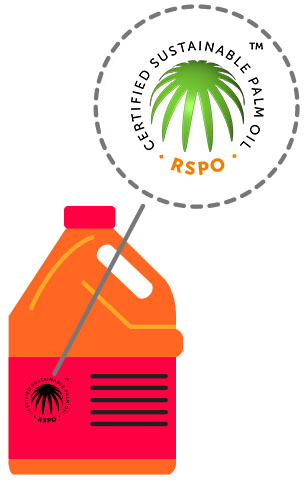CONSUMPTION
Organic Palm Oil has no ecological reality, it’s just a matter of marketing
Extracted from the fruit, the palm oil is today the most popular vegetable oil in the world.
It represents approximately 65% of vegetable oils used. It is estimated that in a supermarket, nearly half of the products for sale contain palm oil. And with world population growth, the volumes could double by 2020 ...
Most of the everyday consumer goods contain palm oil. However, labels are not always clear and palm oil may appear in the composition of the products under different names and derivatives, such as :
INGREDIENTS
VEGETABLE OIL, VEGETABLE FAT, KERNEL, PALM KERNEL OIL, PALMATE, PALMITATE, PALMOLEINE, glyceryl, GLYCEROL, GLYCERIN, STEARIC ACID, Elaeis guineensis, PALMITIC ACID, ETC.
Non-exhaustive list of products that contain palm oil:
CRACKERS, LIPSTICKS, PIZZA DOUGH, INSTANT NOODLES, SHAMPOO, SHAVING FOAM, ICE CREAM, CLEANER, MARGARINE, CHOCOLATE COOKIES, AGRO-FUEL, SOAP, INDUSTRIAL BREAD, PRODUCTS FOR BODY ...
Manufacturers have now invented a new reference for their product: “Contains certified sustainable palm oil” and they were able to adjoin to their business the support of the WWF.
2015 is already claimed to be the “key year” in the battle for sustainable palm oil, the year from which many companies are committed to use 100% sustainable palm oil in their products. Thus, Unilever had planned for several years to put pressure on its suppliers asking them to become “sustainable”. What does a multibillion enterprise do when a label does not exist but when consumers do not want product with palm oil ? We invent new labels that we finance, we create websites and blogs, that gives it the varnish “sustainable development” and environmentalist necessary ...
Do not be bamboozled by speeches or labels !! > All of this is just marketing, far away from the respect for the environment !!!
DO BOYCOTT IT!:
DO NOT BUY OR USE THESE PRODUCTS...IF YOU CAN!!










